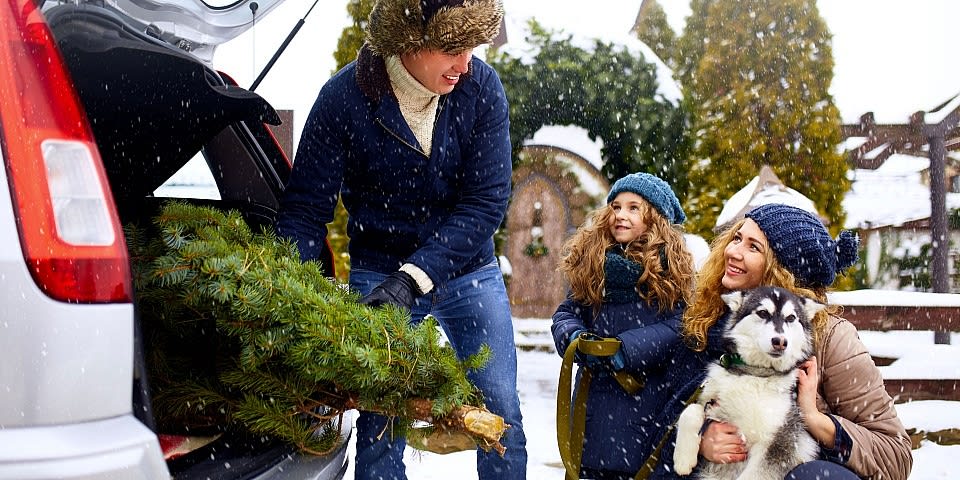MOTORISTS who play Santa by cramming their cars with presents are being warned they could be driving a Christmas death trap. Millions of Brits will be hitting the roads for extended trips over the busy Christmas period, travelling an average 302 miles. But vehicles overloaded with gifts, luggage, pets and family members offer a unique festive danger. And experts are urging motorists to limit ‘loose’ items piled high in cars - objects that could become lethal missiles in the event of an accident.
Mark Tongue, director of UK-leading vehicle leasing firm Select Car Leasing, warned: “Motorists do a lot of driving over the festive period - more than 300 miles per person, according to estimates.
 “And many of those journeys will see cars absolutely crammed to the gills with presents and luggage, with problems exacerbated if you’ve got children or pets. When the car's boot is full, it’s temping to just load every available nook and cranny with items, from the back seat to parcel shelves. But if these objects aren’t secure, then they’re potentially lethal in an accident, or even if you’re simply forced into a situation that calls for harsh braking.
“And many of those journeys will see cars absolutely crammed to the gills with presents and luggage, with problems exacerbated if you’ve got children or pets. When the car's boot is full, it’s temping to just load every available nook and cranny with items, from the back seat to parcel shelves. But if these objects aren’t secure, then they’re potentially lethal in an accident, or even if you’re simply forced into a situation that calls for harsh braking.
Even lightweight items can hit speeds of 65mph in a crash, causing serious impact injuries to any unlucky passenger or driver in the firing line. And clearly the risks are increased for things like hard suitcases. I’d urge drivers to be wary of the dangers and if needs be, use bungee cords - or even gaffer tape - to strap loose items down.”
In September this year, Spanish police issued a similar plea after a young girl, aged 3, tragically lost her life after a tablet computer struck her in the face when her mother collided with a school bus. The mother and another child were treated in hospital for slight injuries. The Spanish association for traffic police said at the time: “Pay attention to the road, watch your distance and do not carry loose objects.” In the UK, the Highway Code Rule 98 warns drivers to secure objects when loading a car. It says: “Make sure any heavy or sharp objects and any animals are secured safely. If there is a collision, they might hit someone inside the vehicle and cause serious injury.”
Meanwhile driving with a dangerously overloaded car - exceeding the weight limits dictated by the manufacturer and therefore invalidating your insurance - could also land you with a £300 fine and three points on your licence.
Mr Tongue adds: “Adding lots and lots of weight to your car clearly puts extras stress on your tyres, while increasing braking distances and affecting your steering.
“You need to make sure your tyre pressures are at the correct inflation - car manufacturers often stipulate in the handbook that a car carrying increased weight will need extra pressure putting into the tyres. “And you should leave a greater gap between you and the car in front, to give you more time to brake in an emergency.” In cold weather, windscreens should be entirely cleared of ice or snow, and long-distance routes clearly mapped-out, so you’re not tempted to fiddle with sat-nav devices en route.

Lights should also be in perfect working order, with lenses cleaned, a process which may have to done before every trip if the roads are covered in slush or other dirt. And number plates must be kept clean and easily visible, and tyres to a tread of at least 3mm - and at the correct pressure. Research last year by the Accident Advice Helpline, found that families typically travel 302 miles over Christmas, spending around nine hours in the car. More than half - 54 per cent - admitted Christmas driving was ‘stressful’, with a fifth worrying about the family’s safety on the road.
A further 43 per cent get said they get ‘anxious' when stuck in holiday traffic while a quarter - 23 per cent - admitted having to pack and unpack the car is a constant ‘chore’. And - shockingly - 13 per cent had witnessed a festive accident during the annual winter getaway.
















